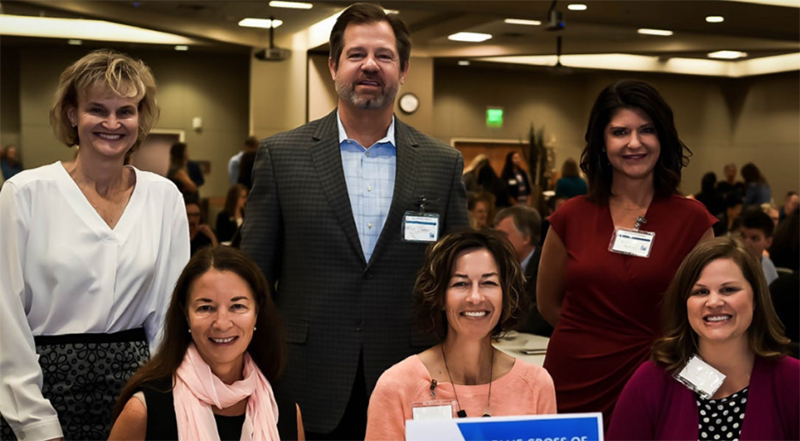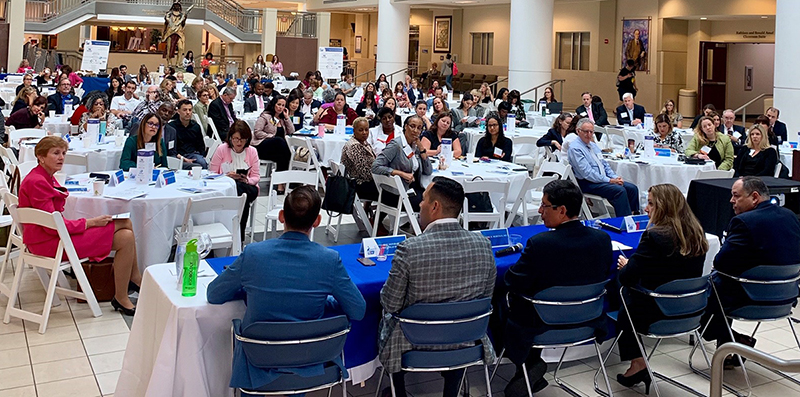
|
The United States spends $88 billion annually on cancer care, with patients paying nearly $4 billion in out-of-pocket costs. The 2019 ACS CAN health care forum examined best practices employers and other payers are using to contain costs while keeping coverage affordable for cancer patients. |
ACS CAN convenes researchers, medical providers, patient advocates and public officials to foster discussion and examine policies that are critical in the fight against cancer. We held our eighth annual National Forum on the Future of Health Care in April 2019 in Washington, D.C., where leaders from government, private and nonprofit organizations gathered to discuss ways to make cancer care more affordable for patients. Panelists discussed innovative new approaches to care at the provider, payer and patient levels and examined how state and federal programs are working to identify ways to mitigate indirect costs of cancer treatment, like transportation and lodging.
|
ACS CAN Idaho’s State Policy Breakfast was held in September 2019 and focused on tobacco’s impact on the state’s health and convened leaders from business, academia, government and the health community. |
|
ACS CAN’s South Florida Policy Forum was held at Nova Southeastern University in October 2019 and highlighted the role of health care systems, researchers and policymakers in addressing patient barriers to clinical trials |
Throughout the country, ACS CAN hosted events in 2019 to educate the public, health community and elected officials about our work and to raise funds to support our mission. These events brought together thousands of leaders from the business, education, government and research communities and covered a wide variety of topics, including cancer research, quality of life, access to care, clinical trials and more.
Partnerships also help ACS CAN further our goal of building a diverse and inclusive organization that better represents communities across America and the diverse reality of the cancer burden.
- Since 2014, ACS CAN has collaborated with the Gates Millennium Scholars Program (GMSP), which offers full scholarships to qualified students from the African American, Hispanic/ Latino, Native American and Asian Pacific Islander communities. These future leaders are invited to take action with ACS CAN, join us at lobby days at state capitols and collaborate with volunteer ambassador teams throughout the country. For the sixth year in a row, six GMSP scholars joined ACS CAN at our Leadership Summit & Lobby Day to meet with federal lawmakers on Capitol Hill alongside our volunteers and staff.
- ACS CAN’s partnership with Delta Sigma Theta Sorority, Inc. continued in 2019, with ACS CAN advocates joining regional Delta Days at the Capitol events to meet with state lawmakers. Members of Delta Sigma Theta and The Links, International were invited to attend our annual Leadership Summit & Lobby Day, to meet with federal lawmakers and join ACS CAN advocates for four days of learning, relationship-building, celebrating cancer survivors and honoring those we’ve lost to the disease.
- ACS CAN partnered with the National African American Tobacco Prevention Network (NAATPN) in 2019 to sponsor in part the State of Black Health National Conference, which convened more than 350 public health professionals, social justice leaders and community advocates in pursuit of health equity for African Americans. This annual event examines the core influences on health, including economic, institutional and social inequalities, and developed a cohesive policy platform to address chronic disease and other health challenges in the African American community.
|
As the founder of coalitions including the Patient Quality of Life Coalition (PQLC) and One Voice Against Cancer (OVAC), ACS CAN leads lobby days on Capitol Hill, works jointly to analyze and address policy proposals and cultivates relationships with partners to expand our ability to impact the cancer burden. |

